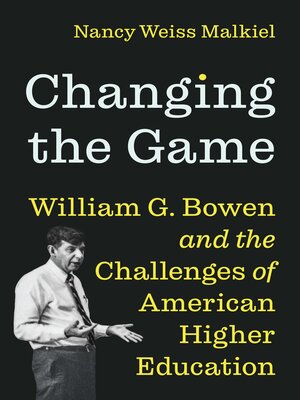Changing the Game
ebook ∣ William G. Bowen and the Challenges of American Higher Education
By Nancy Weiss Malkiel

Sign up to save your library
With an OverDrive account, you can save your favorite libraries for at-a-glance information about availability. Find out more about OverDrive accounts.
Find this title in Libby, the library reading app by OverDrive.



Search for a digital library with this title
Title found at these libraries:
| Library Name | Distance |
|---|---|
| Loading... |
How a visionary university and foundation president tackled some of the thorniest problems facing higher education
As provost and then president of Princeton University, William G. Bowen (1933–2016) took on the biggest and most complex challenges confronting higher education: cost disease, inclusion, affirmative action, college access, and college completion. Later, as president of the Andrew W. Mellon Foundation, he took his vision for higher education—and the strategies for accomplishing that vision—to a larger arena. Along the way, he wrote a series of influential books, including the widely read The Shape of the River (coauthored with Derek Bok), which documented the success of policies designed to increase racial diversity at elite institutions. In Changing the Game, drawing on deep archival research and hundreds of interviews, Nancy Weiss Malkiel argues that Bowen was the most consequential higher education leader of his generation.
Bowen, who became Princeton's president in 1972 at the age of 38, worked to shore up the university's financial stability, implement coeducation, and create a more inclusive institution. Breaking through the traditional Ivy League demographics of white, Protestant, and male, he embraced equal access in admissions for women and men and actively sought to enroll Black, Hispanic, and Asian American students. To "increase the intellectual muscle of the faculty," he used targeted recruiting and enforced higher scholarly standards. In 1988, Bowen moved on to Mellon, where, among many other accomplishments, he developed digital research tools, most notably JSTOR, and promoted racial diversity through the Mellon Mays Undergraduate Fellowship. Attacking problems with tenacity, insight, and deep knowledge, Bowen showed the world of higher education how a visionary leader can transform an institution.







